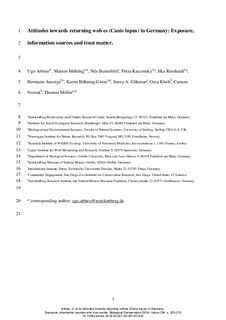Attitudes towards returning wolves (Canis lupus) in Germany: exposure, information sources and trust matter
Arbieu, Ugo; Mehring, Marion; Bunnefeld, Nils; Kaczensky, Petra; Reinhardt, Ilka; Ansorge, Hermann; Böhning-Gaesea, Katrin; Glikman, Jenny A.; Kluth, Gesa; Nowak, Carsten; Müller, Thomas
Journal article, Peer reviewed
Accepted version

Åpne
Permanent lenke
http://hdl.handle.net/11250/2596703Utgivelsesdato
2019Metadata
Vis full innførselSamlinger
- Publikasjoner fra CRIStin - NINA [2364]
- Scientific publications [1392]
Sammendrag
Understanding how exposure and information affect public attitudes towards returning large carnivores in Europe is critical for human-carnivore coexistence, especially for developing efficient and de-escalating communication strategies. The ongoing recolonization of wolves (Canis lupus) in Germany provides a unique opportunity to test the role of different information sources and trust on people's attitudes towards wolves. We conducted a phone survey (n=1250) and compared country-wide attitudes towards wolves with attitudes in a specific region where wolves initially recolonized and have been present since 2000. In particular, we investigate the relationship between information sources, trust and people's attitudes while accounting for factors like knowledge, exposure and socio-cultural determinants of respondents. We found significant differences in attitudes and knowledge about wolves as well as in the use and frequency of information sources between the two population samples. Higher knowledge, information from books and films, science-based information, and higher trust in information sources related positively with positive attitudes towards wolves. Comparatively, information from press or TV news was associated with more negative attitudes. Providing science-based information to the public and building trust in information is likely to be one measure, among others, to dampen extreme attitudes and improve people's appreciation of costs and benefits of human-carnivore coexistence. Management of conflictual situations emerging from large carnivore recolonization in Europe and beyond should consider incorporating assessments of people's use of and trust in information in addition to existing tools to pave new ways for constructive human-carnivore coexistence.
